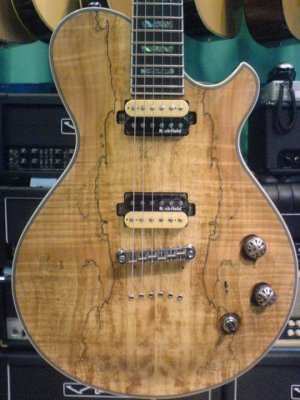OK, I find this debate entertaining as all heck so I might as well add my 0.02$. (Well, I DID post here back in 2007 but the statute of limitation is gone for that so...

)
I literally cannot tell you how many times I've heard the advice "if you wanna find a diamond in the rough you gotta try many of this model". However, never was it as true for me as when I bought the bellow axe:
View attachment 92267
Michael Kelly Patriot Limited.
(As you can see it is a string-through-body).
Back then, I knew I wanted to buy that model, and the guy in my favorite guitar shop was able and willing to sit with me after he'd closed for mid-day and bring down ALL the guitars of THAT model. All from the same batch I should add.
Every one of them made EXACTLY the same with the exact same hardware and pickups and all of them set up by the same person.
Every one of them sounded appreciably different but no two guitars sounded as different as, ironically, the two that I liked the most.
One was appreciably heavier than the rest, the other appreciably lighter than the rest. They had maybe a 25% difference in weight between them.
The heavy one was, well, heavier in tone, much MUCH darker and had a tendency to quickly let the highs of the note die out and let the lower-end linger more.
The light one was WAY brighter, with a much sharper attack that also let the notes bloom more. I went back and forth many times but ended up with the second.
After that, I can never and will never accept that the wood a guitar is made of makes no difference in the way it will sound because I experienced it first hand in a most profound way.
After many years of playing I will also attest to the fact that, different species of wood tend to display certain characteristics the same way different breeds of dogs tend to have certain behavioral traits.
However, just like no two dogs are the same, even if they're from the same litter, no two guitars are the same either, even if constructed by the same person.
So, knowing what species of woods a guitar was made with will only help you ballpark how the guitar will sound but it will never tell you the whole story.
Similarly, I call bull that one can blind-listen a guitar with
no information and identify the exact wood combination it was made with, even if it's as simple as Alder/Maple.
On the other hand, come on guys, that guitar that was made of steel? I could IMMEDIATELY tell it wasn't made of wood. Not that is sounded bad, (it actually sounded great!) but I could immediately pick up that metallic ringing while that "organic" quality associated with wooden instruments simply wasn't there. So yeah, I also call bull on "the material an electric guitar is made of doesn't matter" because my ears tell otherwise.

